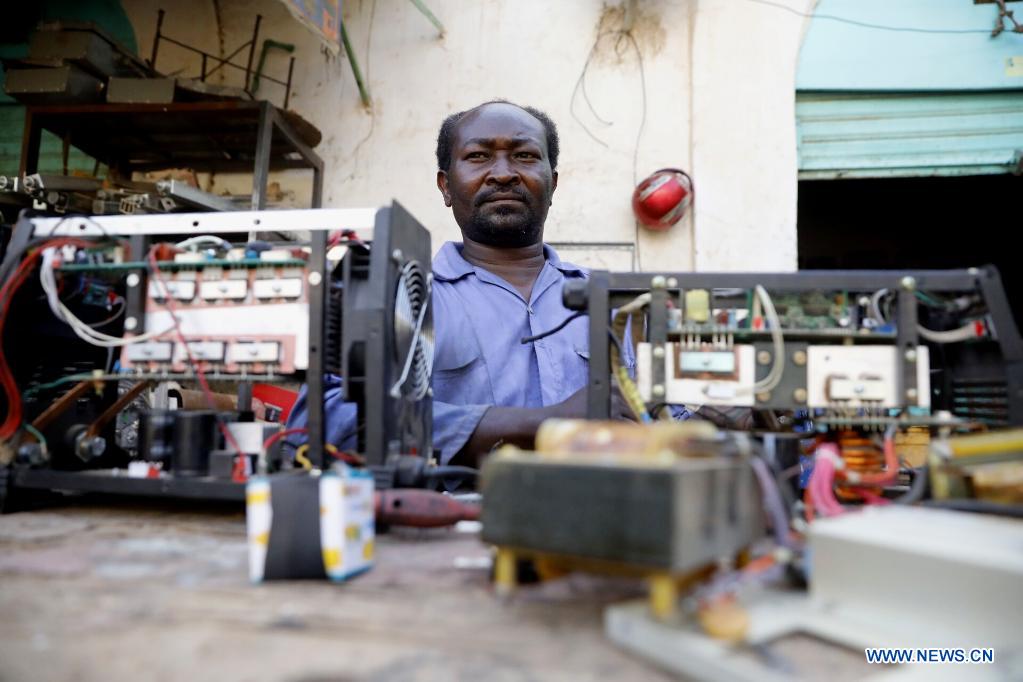
A Sudanese daily-wage worker waits to be hired in Khartoum, Sudan, June 1, 2021. Sudan is witnessing an accelerating economic decline amid continued deterioration in the exchange price of the Sudanese pound, a rising inflation rate and a great hike in the prices of essential commodities. (Xinhua/Mohamed Khidir)
KHARTOUM, May 30 (Xinhua) -- Sudan is witnessing an accelerating economic decline amid continued deterioration in the exchange price of the Sudanese pound, a rising inflation rate and a great hike in the prices of essential commodities.
Sudanese economic experts have warned that the country could fall into economic recession due to the loss of purchasing power, uncontrolled commodity prices, and the collapse of the local currency.
"There is a clear economic deterioration, and the state must intervene through its mechanisms to stop the collapse of the (Sudanese) pound, curb the inflation and control the prices hike," Kamal Ahmed Yousif, dean of faculty of commerce at Al Neelain University in Sudan, told Xinhua.
He attributed the decline in the exchange price of the Sudanese pound against other currencies to weakness of production and the donors' failure to fulfil their promises to support Sudan.
"The productive sectors must be strengthened, cash exports be increased and unnecessary imported goods be reduced," he added.
According to dealers in the foreign exchange market in the capital Khartoum, the Sudanese pound continued its decline against foreign currencies with an exchange rate of 505 Sudanese pounds per U.S. dollar on Sunday against its official exchange rate of about 420 pounds.
Al-Samawal Fadlessid, a Sudanese economic analyst, blamed the government for the decline of the local currency.
"The government is the biggest buyer of the dollars on the parallel market to secure its foreign exchange needs," Fadlessid told Xinhua.
"There is a large monetary base moving outside the banking system for speculation in the prices of the dollar, where there is a steady increase in foreign currency exchange rates around the clock," he added.
The expert expressed his concern that the situation would end up in economic collapse and a general recession, unless the government intervenes to redress the matter.
In the meantime, Sudanese Finance Minister Jibril Ibrahim on Sunday accused unnamed parties of attempting to sabotage the national economy.
"The prices of the dollar in the parallel market are illogical and have nothing to do with the reality of the market. They are intended to cause more turmoil and confusion in the national currency market and to create problems that negatively affect the national economy," said Ibrahim in a statement.
"The state is able to intervene to provide the required resources for the market of basic and strategic commodities," he said, stressing the availability of foreign exchange in the Central Bank of Sudan and the ability to meet the demands of individuals.
The continued decline of the Sudanese pound against foreign currencies led to a great hike in the prices of necessary commodities, which has exacerbated the suffering of the citizens.
In February, Sudan's transitional government sharply devaluated the national currency in a bid to end the economic and monetary imbalances. In March, according to a report of Sudan's Central Statistics Bureau, the inflation rate in Sudan jumped to about 342 percent.
Sudan has been undergoing an economic crisis since the secession of South Sudan in 2011, due to which Sudan lost 75 percent of its oil revenues.
In 2012, Sudan approved five packages to remove bread and fuel subsidies, which sparked a series of protests.
In December 2018, worsening economic conditions sparked popular protests across Sudan, leading to the ouster of former President Omar al-Bashir in April 2019. Enditem